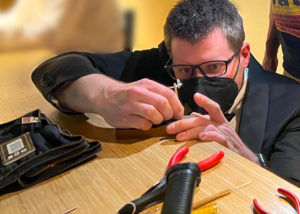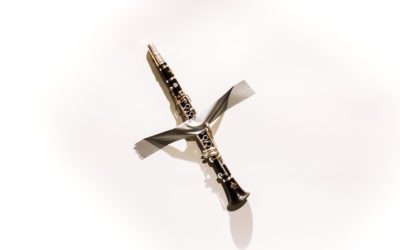I know clarinets. I know how they can sound, I know how to fix them, and I know how to play them. That last thing shouldn’t be taken for granted—knowing the simple mechanics of replacing pads and unbending keys isn’t quite the same without that embodied knowledge of how the instrument should feel after it’s had those fixes.
I started my career in music as a performer, and I trained for years at Juilliard before going on to play in numerous orchestras and symphonies throughout the city. In fact, I still do, which is why when you look in the pit some nights you might see the flash of a screwdriver as the resident Performer-Repairman fixes a colleague’s wind instrument between acts. But even if you aren’t in the pit with me, I still take that intimate understanding and experience of the clarinet in action to your instrument.
Understand the Subtleties of Playing
Having played in various high-caliber orchestras and symphonies, as well as in notable Broadway productions, I understand the subtleties and nuances of how instruments work. Once I play a clarinet, or an auxiliary instrument, I know what tweaks are needed to get the most out of it. Being a performer and doing repairs infinitely helps me dial in quickly and diagnose—and then know how to fix—any problems.
Keen Ear for How Instruments Should Sound
Each instrument has its own sound. In fact, even wind instruments of the same make/model can have varied acoustical characteristics, If you’re not working with a musician for your instrument maintenance and repairs, you lose this important benefit of having your work done by a performer plus repair technician in one.
Quick Adjustments in a Pinch

Liam Burke fixing Met Opera Oboist Susan Specter’s instrument between acts.
On more than one occasion, I’ve been known to provide repairs for colleagues in between performances or rehearsals, or even between acts at the Metropolitan Opera. I play in numerous ensembles with other clarinetists and can gauge what will help others in quick fixes and even equipment upgrades. Plus, because of my experience performing with some of the most renowned woodwind sections, I can listen to someone play and notice if they would benefit from repairs. If it’s something minor, I’m happy to take care of it during a break. Just another benefit of being a performer and doing repairs!
Know the Difference Between Maintenance and Repair
When it comes to instruments, there’s regular maintenance, and then there’s repair. Consider having a Clean, Oil, Adjust done for your instrument every 6 months (or risk having to come for an emergency repair). With ongoing, regular maintenance, I’m likely to find problems quicker and often avoid major repair issues. It’s best to have your instrument looked at regularly before it needs to be repaired. Most issues that plague instruments and performers result from regular usage of the instrument. And as a performer, I can preemptively fix those issues when you visit me for routine maintenance. I’ll help you achieve and maintain the acoustical and technical aspects that you are aiming for so that you can sound (and feel) your best when performing.


